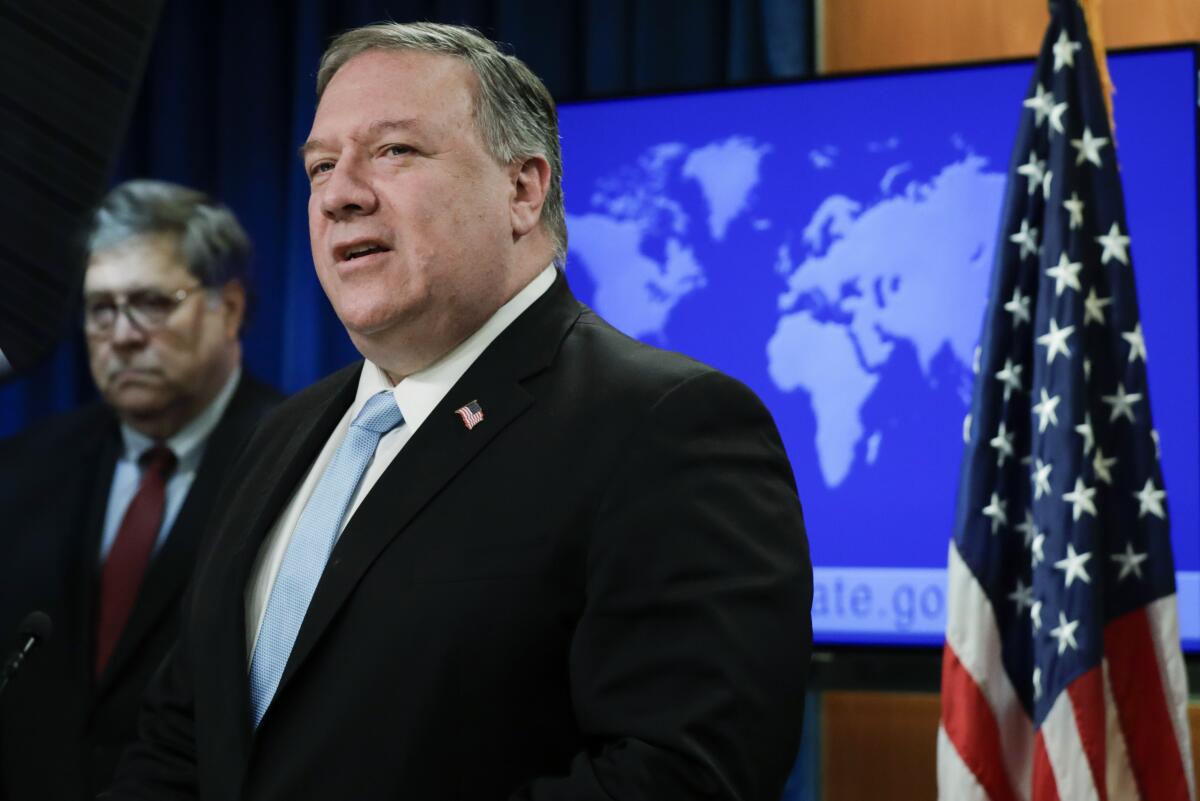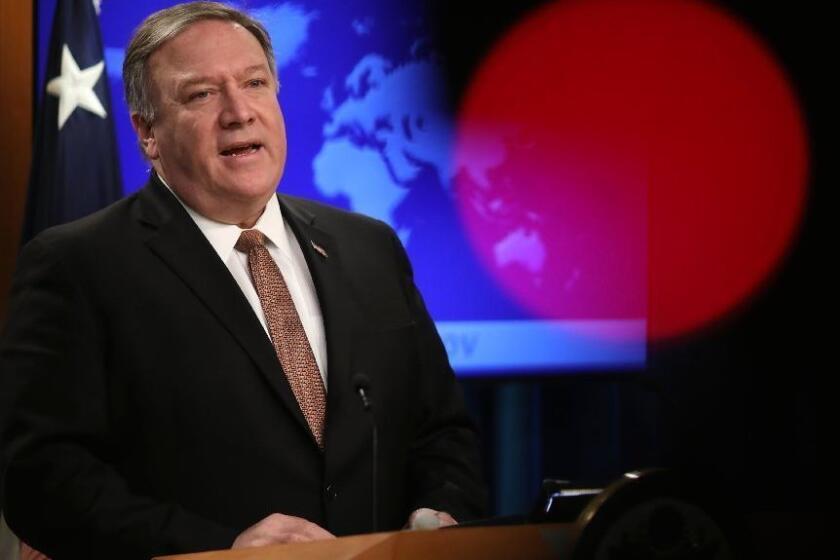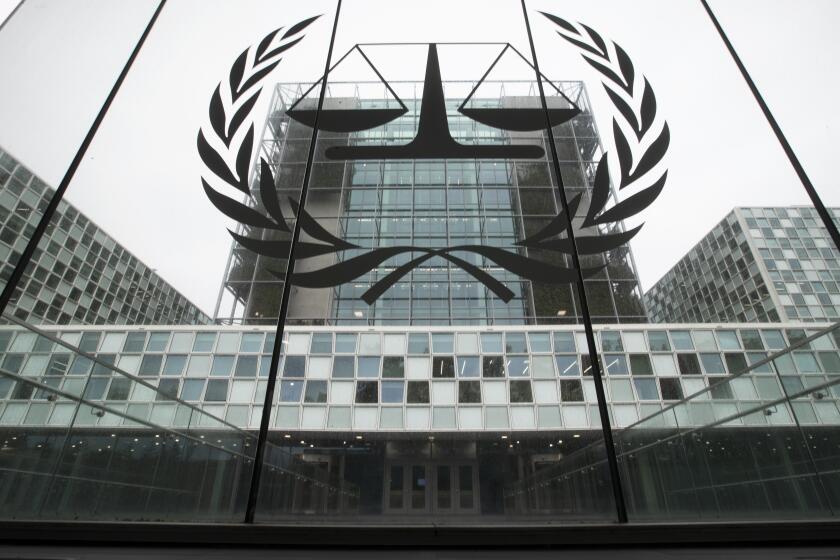Trump OKs sanctions against International Criminal Court employees

WASHINGTON — President Trump lobbed a broadside attack Thursday against the International Criminal Court by authorizing economic sanctions and travel restrictions against court workers involved in investigating American troops and intelligence officials and those of allied nations, including Israel, for possible war crimes in Afghanistan and elsewhere.
Trump’s executive order marked his administration’s latest attack against international organizations, treaties and agreements that don’t hew to its policies. It would block the financial assets of court employees and bar those employees and their immediate relatives from entering the United States.
Secretary of State Michael R. Pompeo denounced The Hague-based tribunal as a “kangaroo court” that has been unsuccessful and inefficient in its mandate to prosecute war crimes. He said that the U.S. would punish the ICC employees for any investigation or prosecution of Americans in Afghanistan and added that they could also be banned for prosecuting Israelis for alleged abuses against Palestinians.
Pompeo’s comments were echoed by Defense Secretary Mark Esper, Atty. Gen. William Barr and national security advisor Robert O’Brien, who spoke at a State Department announcement of the new measures. Barr also announced that the U.S. would investigate possible corruption within the ICC hierarchy that he said raised suspicions that Russia and other adversaries could be interfering in the investigatory process.
None of the four men took questions from reporters at the event.
The Hague-based court was created in 2002 to prosecute war crimes and crimes of humanity and genocide in areas where perpetrators might not otherwise face justice. It has 123 state parties that recognize its jurisdiction.
The Trump administration said Friday it will revoke or deny U.S. visas for judges, lawyers or other members of a major international tribunal if they investigate or prosecute U.S. soldiers for potential war crimes.
Human rights groups deplored the Trump administration’s move.
“The Trump administration’s latest action paves the way for imposing sanctions against ICC officials and demonstrates contempt for the global rule of law,” said Andrea Prasow, the Washington director of Human Rights Watch. “This assault on the ICC is an effort to block victims of serious crimes whether in Afghanistan, Israel or Palestine from seeing justice. Countries that support international justice should publicly oppose this blatant attempt at obstruction.”
Thursday’s announcement is the latest action that puts the administration at odds with allies in Europe and elsewhere. Since taking office, Trump has withdrawn from the Paris climate accord, the Iran nuclear deal and two arms control treaties with Russia. He has pulled the U.S. out of the U.N. Human Rights Council and the U.N. Educational, Scientific and Cultural Organization, threatened to leave the International Postal Union and announced an end to cooperation with the World Health Organization.
Unlike those treaties and agreements, though, the United States has never been a member of the International Criminal Court. Administrations of both parties have been concerned about the potential for political prosecutions of American troops and officials for alleged war crimes and other atrocities.
European Union foreign policy chief Josep Borrell said Trump’s order “is a matter of serious concern,” describing the European Union nations as “steadfast supporters of the International Criminal Court.”
“The court has been playing a key role in providing international justice and addressing the gravest international crimes,” he said. “It is a key factor in bringing justice and peace. It must be respected and supported by all nations.”
The executive order authorizes the secretary of State, in consultation with the Treasury secretary, to block financial assets within U.S. jurisdiction of court personnel who directly engage in investigating, harassing or detaining U.S. personnel. The order authorizes the secretary of State to block court officials and their family members involved in the investigations from entering the United States. The ICC-related travel restrictions go beyond what the State Department issued last year.
White House Press Secretary Kayleigh McEnany said in a statement that, despite repeated calls by the United States and its allies, the ICC has not embraced reform. She alleged the court continues to pursue politically motivated investigations against the U.S. and its partners, including Israel.
“We are concerned that adversary nations are manipulating the International Criminal Court by encouraging these allegations against United States personnel,” McEnany said. “Further, we have strong reason to believe there is corruption and misconduct at the highest levels of the International Criminal Court office of the prosecutor, calling into question the integrity of its investigation into American service members.”
The U.S. has extracted pledges from most of the court’s members that they will not seek such prosecutions and risk losing U.S. military and other assistance.
Appeals judges gave the green light for prosecutors to open an investigation targeting the Taliban, Afghan forces and U.S. military and CIA personnel for war crimes and crimes against humanity.
However, ICC prosecutors have shown a willingness to press ahead with investigations into U.S. service members and earlier this year launched one that drew swift U.S. condemnation.
Last year, after then-national security advisor John Bolton threatened ICC employees with sanctions if they went forward with prosecutions of U.S. or allied troops, including from Israel. Pompeo then revoked the visa of the court’s chief prosecutor, Fatou Bensouda. Bensouda had asked ICC judges to open an investigation into alleged war crimes in Afghanistan that could have involved Americans. The judges initially rejected the request, but the denial was overturned after Bensouda appealed the decision and the investigation was authorized in March.
The appellate ruling marked the first time the court’s prosecutor has been cleared to investigate U.S. forces, and it set the global tribunal on a collision course with the Trump administration. Bensouda pledged to carry out an independent and impartial investigation and called for full support and cooperation from all parties. Pompeo called the decision “a truly breathtaking action by an unaccountable political institution masquerading as a legal body.”
The case involves allegations of war crimes committed by Afghan national security forces, Taliban and Haqqani network militants, as well as U.S. forces and intelligence officials in Afghanistan since May 2003. Bensouda say there’s information that members of the U.S. military and intelligence agencies “committed acts of torture, cruel treatment, outrages upon personal dignity, rape and sexual violence.”
More to Read
Sign up for Essential California
The most important California stories and recommendations in your inbox every morning.
You may occasionally receive promotional content from the Los Angeles Times.











